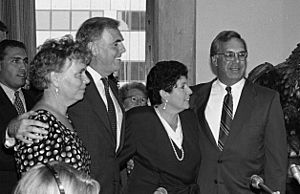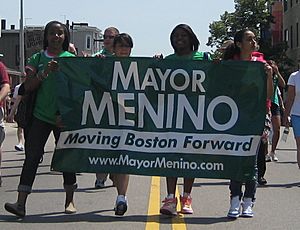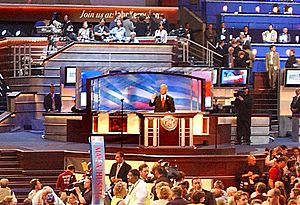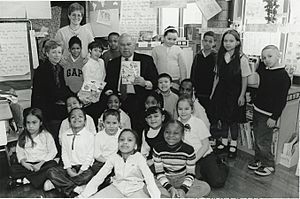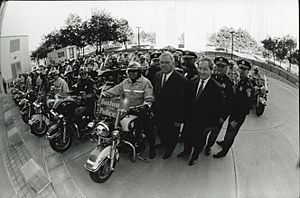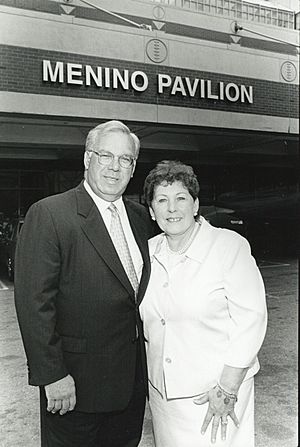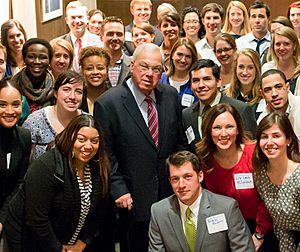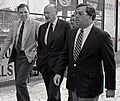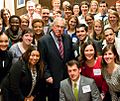Thomas Menino facts for kids
Quick facts for kids
Thomas Menino
|
|
|---|---|
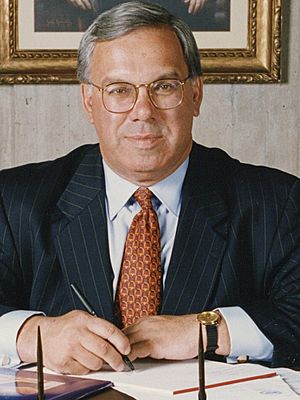 |
|
| 53rd Mayor of Boston | |
| In office November 16, 1993 – January 6, 2014 Acting: July 12, 1993 – November 16, 1993 |
|
| Preceded by | Raymond Flynn |
| Succeeded by | Marty Walsh |
| 60th President of the United States Conference of Mayors | |
| In office 2002–2003 |
|
| Preceded by | Marc Morial |
| Succeeded by | James Garner |
| President of the Boston City Council | |
| In office January 1993 – March 1993 |
|
| Preceded by | Dapper O'Neil |
| Succeeded by | James Kelly |
| Member of the Boston City Council for the 5th district |
|
| In office 1984–1993 |
|
| Preceded by | Constituency established |
| Succeeded by | Daniel F. Conley |
| Personal details | |
| Born |
Thomas Michael Menino
December 27, 1942 Boston, Massachusetts, U.S. |
| Died | October 30, 2014 (aged 71) Boston, Massachusetts, U.S. |
| Resting place | Fairview Cemetery |
| Political party | Democratic |
| Spouse |
Angela Faletra
(m. 1966) |
| Children | 2 |
| Education | Boston College Mount Ida College (AA) University of Massachusetts Boston (BA) |
Thomas Michael Menino (born December 27, 1942 – died October 30, 2014) was an American politician. He was the 53rd Mayor of Boston from 1993 to 2014. He served longer than any other Boston mayor. He became mayor in 1993. Before that, he was the "acting mayor" for three months. He took over when the previous mayor, Raymond Flynn, left. Menino was also a member of the Boston City Council and its president in 1993.
People called Menino an "urban mechanic." This meant he focused on everyday city problems. He was very popular with the public. During his time as mayor, Boston grew a lot. New areas like the Seaport District were built. Dudley Square (now "Nubian Square") and the area around Fenway Park were also redeveloped. Crime in Boston dropped to very low levels. The city became one of the safest large cities in the United States. Menino also worked on many environmental projects. In his last year, Boston faced the Boston Marathon bombing, a serious event.
Menino was a Democrat with liberal views. He was a strong leader in Boston politics. He also played a role in national politics. He was president of the United States Conference of Mayors from 2002 to 2003. He helped bring the 2004 Democratic National Convention to Boston. He also co-founded Mayors Against Illegal Guns with New York City Mayor Michael Bloomberg. After being mayor, he became a professor at Boston University. He also helped start the Initiative on Cities, a research center about city leadership.
Contents
Early Life and Education
Thomas Menino was born on December 27, 1942. He grew up in Readville, part of Boston's Hyde Park neighborhood. His parents, Susan and Carl Menino, were of Italian descent. Readville was a community with many Italian-American families. Menino's father worked as a factory foreman. His grandparents lived on the first floor of his family's home. When he was young, Menino experienced prejudice because he was Italian-American.
He finished St. Thomas Aquinas High School in Jamaica Plain in 1960. Menino took some night classes at Boston College. But he decided college was not for him at that time. He later earned an associate degree in Business Management in 1963. This was from Mount Ida College, then called Chamberlayne Junior College. In 1984, while on the Boston City Council, Menino went back to school. He studied at the University of Massachusetts Boston. He earned a Bachelor of Arts degree in community planning in January 1988.
Early Career and City Council
Before becoming a politician, Menino worked in housing. He helped people move for the Boston Redevelopment Authority. He also researched housing and urban development for the state. He was an assistant to state senator Joseph F. Timilty. Menino met Timilty in 1961 when he was 19. Timilty became an important political guide for him.
Menino started working in sales for Metropolitan Life Insurance in 1963. He left that job in 1968. Timilty helped him get a starting job at the Boston Redevelopment Authority. Menino worked on Timilty's campaigns for mayor in 1971 and 1975. Because of this, Mayor Kevin White fired Menino from his job. Menino also worked on Timilty's campaign in 1979.
Joining the City Council
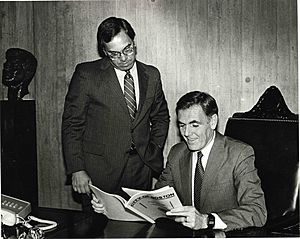
Menino was elected to the Boston City Council in November 1983. He won for the new District 5. He received 75 percent of the votes. Some believed the district was designed to help him win. In the 1983 election, Menino supported Raymond Flynn for mayor. Menino represented District 5 for nine years. In 1984, he became chairman of the council's Planning and Development Committee. He ran for re-election without anyone opposing him in November 1985.
In 1986, Mayor Raymond Flynn offered Menino a job. It was to be the Parks and Recreation Commissioner. Menino was surprised but thought about it. He did not take the job. He was re-elected in November 1987 with 87 percent of the votes. Menino also thought about running for Suffolk County sheriff in 1986 but decided not to.
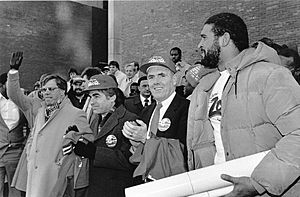
In 1988, Menino became chairman of the City Council's Finance Committee. This committee was later renamed the Ways and Means Committee in 1990. Menino stayed as chairman during his entire time on the City Council. He became known for understanding the city budget well. He knew how to use money to help residents. The Boston Globe called him a "vigilant watchdog of the city budget." He was re-elected without opposition in November 1989. He also won in November 1991 with 82 percent of the votes. He helped create the City Council's Tourists and Tourism Committee in 1991.
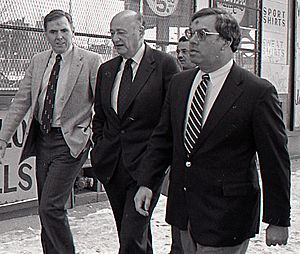
In 1992, Menino planned to run for United States Congress. But the district he wanted to run in was removed due to changes in population. So, Menino decided not to run for Congress. In 1993, Menino was elected president of the Boston City Council. This was a bit of a surprise win.
During his time on the City Council, Menino was praised for his "aptitude for details of city government." He was also known for being close to Mayor Flynn. He had a reputation for being "diligent and attentive to detail." As a city councilor, Menino supported programs for clean needle distribution. These programs aimed to prevent the spread of HIV/AIDS. He also pushed for more funding for AIDS programs. Menino supported a study by the city government on homelessness. He also wanted to reorganize the Boston City Hospital.
Becoming Acting Mayor
In March 1993, President Clinton chose Mayor Flynn to be the United States Ambassador to the Holy See. Mayor Flynn accepted this job. This meant Menino, who was president of the Boston City Council, would become the acting mayor. Menino and Flynn had been friends for a long time. However, their relationship became a bit strained as Flynn prepared to leave office.
When Flynn resigned on July 12, 1993, Menino became the acting Mayor of Boston. He served until the election in November 1993. He was the first Italian American to lead the city. Some people thought Menino would just be a temporary leader. They believed he would not make big changes.
During his time as acting mayor, Menino made some important decisions. He signed an agreement for $3.7 million in state funds. This money was for building a recycling facility in the city. Menino also froze water utility rates. These rates were rising to pay for cleaning up Boston Harbor. This freeze was popular with residents.
Running for Mayor
Menino won the 1993 Boston mayoral election. This made him the city's first non-Irish American mayor since the Great Depression. Menino ran a quiet campaign at first. He formally announced his candidacy on August 16, 1993. Many other candidates had already entered the race. When he ran for mayor, Menino promised to serve "only two terms." However, he ended up serving much longer. He was elected to a fifth term in 2009.
Mayor of Boston
Menino served five terms as mayor of Boston. This was a record-breaking amount of time. On March 28, 2013, Menino announced he would not seek a sixth term. After Menino's death, The New York Times wrote that he "presided over one of the most successful urban renaissances in modern American history."
Politics and Reelection

Menino was a Democrat and had liberal political views. He led a powerful political organization in Boston. The Boston Globe said in 2009 that Menino had built the most extensive political operation in modern Boston history.
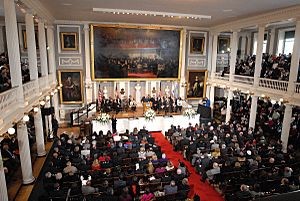
Menino was re-elected in 1997. No one officially ran against him. In the 2001 mayoral election, Menino faced Peggy Davis-Mullen. Menino was expected to win easily. He had an approval rating of almost 85%. Menino won with 76.06% of the votes. In 2005, Menino won again with 67.52% of the votes. He faced Maura Hennigan. In the 2009 election, Menino faced Michael F. Flaherty. Menino won with 57.27% of the votes.
National Influence
In May 2002, Menino became president of the United States Conference of Mayors. He held this position for 13 months. Menino helped bring the Democratic National Convention to Boston in 2004. This event was important for the city.
On April 25, 2006, Menino and New York City Mayor Michael Bloomberg started the Mayors Against Illegal Guns Coalition. Their goal was to make communities safer by removing illegal guns from the streets. Menino remained a co-chair of this group. It started with 15 mayors and grew to include over 900 mayors from both major political parties. Menino supported Hillary Clinton for president in 2008. He sent his campaign workers to New Hampshire to help her.

Menino spoke at the 2012 Democratic National Convention. In September 2012, he supported Elizabeth Warren for U.S. Senate.
City Finances
During Menino's time as mayor, Boston always had more money than it spent. This meant the city's financial health was strong. Because of this, financial rating companies like Moody's and Standard & Poor's improved Boston's bond rating nine times.
Social Issues and Rights
Menino was a co-founder of Mayors Against Illegal Guns. He was also a strong supporter of gay rights. By 1993, he publicly supported allowing gay and lesbian couples to be foster parents. He also supported city employees getting sick leave or time off for domestic partners.
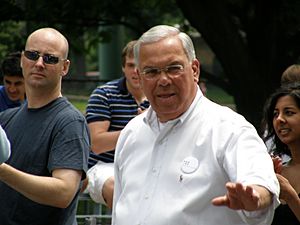
In 1998, Menino signed an order. It allowed domestic partners of gay, lesbian, and unmarried city employees to receive health benefits. Boston was one of the first cities to offer such benefits. In 2003, Menino supported same-sex marriage. He once refused to march in the South Boston St. Patrick's Day parade because gay groups were not allowed. In 2012, Menino led the Mayors for Freedom to Marry effort. Also in 2012, Menino spoke out against Chick-fil-A opening restaurants in Boston. He cited their opposition to same-sex marriage. He said Boston was a leader in social justice. He knew he could not stop them, but he made it clear they were not welcome.
City Development
During Menino's time, Boston's office and residential spaces grew by 11%. About 80 million square feet of new buildings were constructed. Menino was sometimes criticized for favoring certain developers. Between 2000 and 2010, Boston built 20,500 new homes. This included 5,500 affordable housing units. New high-priced housing led to gentrification. This meant some long-time residents could no longer afford to live in their neighborhoods. Over 12,000 new college dormitory rooms were also built.
In 2010, a law was passed to create a downtown business improvement district. Menino had wanted this since the 1990s. Menino also focused on developing Boston's neighborhoods. He organized city services by neighborhood. He appointed neighborhood coordinators. These people acted as city representatives in their areas. He believed development should happen everywhere. In 2001, Governing magazine named Menino "Public Official of the Year." This was for his effective neighborhood development.
Menino oversaw the development of the Seaport District in South Boston. This area is also known as the "Innovation District." Menino also prioritized the redevelopment of Dudley Square (now "Nubian Square"). About $330 million in private development happened there during his time. Menino was involved in talks about building a new baseball stadium near Fenway Park. However, the Boston City Council rejected the plan. Instead, Fenway Park was renovated. Menino supported the renovation efforts. He also reviewed new development in the surrounding area. After 2004, the area around Fenway Park saw major new developments.
At the end of Menino's time as mayor, the city was experiencing a building boom. Moody's Investor Service said in 2012 that Boston had the strongest commercial real estate market in the country.
Education Initiatives
Student performance in Boston Public Schools improved during Menino's time. Test scores went up. However, Menino was against many school reforms. He had promised to improve the schools. Menino was against publicly funded tuition vouchers for a long time. In June 2009, Menino supported paying teachers based on their performance. Menino tried to make school days longer. But the Boston Teachers Union opposed this. For years, Menino was against charter schools. But in 2009, he changed his mind. He praised charter schools for attracting good teachers. He also liked their flexible rules and ability to meet student needs.
Public Safety and Law Enforcement
During Menino's time, crime in Boston dropped to record lows. The city became one of the safest large cities in the United States. Boston's violent crime rate fell significantly. Menino became mayor during the "Boston Miracle." This was a successful effort by police, churches, and community groups. They worked together to reduce violence among young people.
In his last year in office, the Boston Marathon bombing happened. Menino was in the hospital recovering from a leg injury. He left the hospital to be present after the attacks.
Public Health Efforts
Menino oversaw talks that led to a merger in January 1996. The Boston City Hospital, which was struggling, merged with the BU Medical Center. This merger aimed to improve healthcare for the city's poorer residents. It created the privatized Boston Medical Center. The Menino Pavilion at the Boston Medical Center was later named after him. This honored his work in public health.
In the early 2000s, Menino supported a statewide ban on smoking in indoor workplaces in Massachusetts. In 2012, Boston became the first large city in Massachusetts to ban smoking in public housing. As mayor, Menino continued to support needle exchange programs. In 2004, Menino banned sodas from Boston Public Schools. This was to fight childhood obesity. In April 2011, he banned sugary drinks in city buildings and at city events. This was another effort to fight obesity.
Environmental Actions
In 2008, Popular Science magazine ranked Boston as the third-greenest city in the United States. In the decade before, Boston had started new environmental projects. These included planting more trees and single-stream recycling. The city also increased its solar power use. It invested in alternative energy and biking. One new idea was green building zoning. This required large private buildings to be "green" by LEED standards. Boston was the first city to change its building code for green construction.
Menino was a founding member of the US Mayors' Alliance for Green Schools. Under Menino, Boston became the first major U.S. city to include green building standards in its zoning laws. Boston changed its rules to require large private construction projects to follow U.S. Green Building Council's LEED standards. Boston also worked with other groups to reduce greenhouse gas emissions. They aimed for a 7% reduction by 2012 and 80% by 2050 compared to 1990 levels. Menino released an updated Climate Action Plan for Boston on Earth Day 2011. The plan aimed to reduce community greenhouse emissions by 25% by 2020. It also sought to include climate change planning in all city projects.
Public Image and Popularity
Menino was very popular. People jokingly called him "Mayor for Life." In July 2012, his approval rating was 82%. Menino often attended community events like parades and meetings. Surveys showed that more than half of Boston residents had personally met Menino. This is a very high number for a mayor of a big city.
Menino was famously called an "urban mechanic." He even used this nickname himself. It meant he focused strongly on everyday city problems. This nickname had both positive and negative meanings. He was given this nickname in late 1994.
After Being Mayor
After leaving office in January 2014, Menino became a Professor at Boston University. He also co-founded the Initiative on Cities (IOC). This is a research center about urban leadership at the university. As a co-founder and co-director, Menino helped the IOC connect academic studies of cities with real-world city management. They did this by holding conferences and seminars. They also provided research funding for students and faculty.
The IOC also created the Menino Survey of Mayors. This is the only national survey of American mayors. It looks at the biggest challenges and opportunities facing city leaders in America.
Speech Style
Mayor Menino was known for his unique voice and strong Boston accent. He was also known for his speech errors. Some of these were malapropisms. This means he used a wrong word that sounded similar to the right one. For example, he once referred to Boston's parking shortage as "an Alcatraz around my neck." He meant to say "albatross around his neck." Because of these errors, some people called him "Mumbles Menino."
Personal Life
Menino met Angela Faletra in 1963 while playing tennis. They married three years later in 1966. They lived in Hyde Park until his death. They had two children, Susan and Thomas Jr., and six grandchildren.
Menino was hospitalized several times while he was mayor. He had problems with abdominal pain and kidney stones. In 2003, he had surgery to remove a rare sarcoma from his back. The tumor had not spread. He returned to work a few days later. In 2004, he was diagnosed with Crohn's disease. This explained his ongoing intestinal problems. This condition required lifelong treatment and careful diet monitoring.
Illness and Passing
In March 2014, Menino announced he had an advanced form of cancer of unknown primary origin. It had spread to his liver and lymph nodes. He began intensive chemotherapy treatment. On October 23, 2014, he announced he would stop cancer treatments. He wanted to spend more time with his family. He passed away in Boston at age 71 on October 30, 2014. He was receiving hospice care at Brigham and Women's Hospital.
Menino's body was available for public viewing at Faneuil Hall in Boston on November 2. His funeral was held the next day at Most Precious Blood Parish in Hyde Park. Menino had planned his own funeral services. Many important people attended, including his successor, Marty Walsh. Also there were Governor Deval Patrick, former President Bill Clinton, Vice President Joe Biden, and Secretary of State John Kerry. Sports legends like Bill Russell, David Ortiz, and Pedro Martínez also attended. He was buried at Fairview Cemetery in Hyde Park.
Honors and Legacy
In 2013, Harvard University gave Menino an honorary degree. Several places in Boston are named after him, including:
- Mayor Thomas M. Menino Park, in Charlestown
- Menino Arts Center, in Hyde Park
- Menino Pavilion, at the Boston Medical Center
- Thomas M. Menino Community Center, in Roslindale
- Thomas M. Menino Fields at Millennium Park, in West Roxbury
Images for kids
 | Toni Morrison |
 | Barack Obama |
 | Martin Luther King Jr. |
 | Ralph Bunche |


